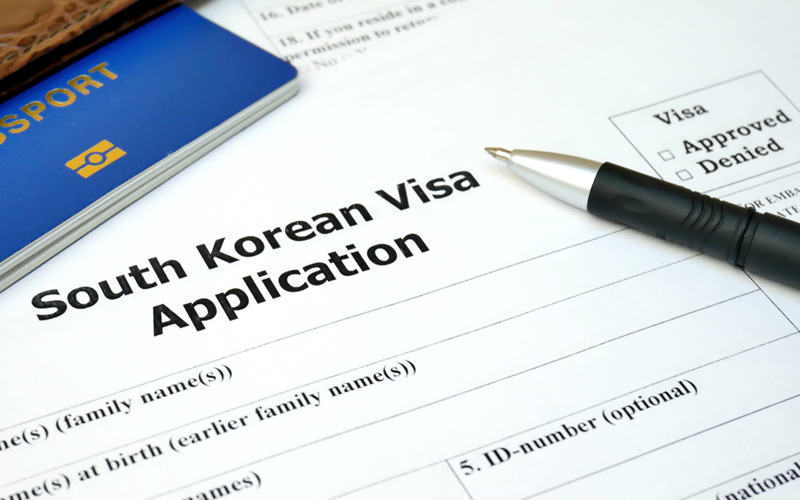Are you looking to teach English abroad? Well then, South Korea may be the perfect destination for you. I’ve had the opportunity to experience what it felt like to be an English teacher in Seoul and Busan – the privilege of living out my dream of teaching English.
If you’re eager to jump on the plane and head off to South Korea, there are a few hoops you’ll need to jump through first, that is, to know the requirements and qualifications to teach English in South Korea.
First, most available positions require a Bachelor’s degree in any field. In addition, schools and ESL employers usually ask for a TEFL certification or at least some prior teaching experience. Most Korean public schools and private academies (Hagwons) prefer native English speakers, though this isn’t always necessary.
As for the visa, you’ll have to apply for an E-2 teaching visa. Passing a criminal background check and undergoing a health examination is a mandatory process while applying for a visa.
Speaking about the cities – Seoul, Incheon, and Daegu have plenty of opportunities for English teachers to prove their worth. So, if you’ve got what it takes to be an excellent teacher, South Korea is your destination.
So let’s take a look at the requirements in detail, and we’ll see each other on the bustling streets of Busan or Seoul sometime soon.
Qualifications to be an English teacher in South Korea
To teach English in South Korea, you will need the following:
- A bachelor’s degree in any field
- A reputed TEFL/TESOL certification
- The ability to obtain an E2 teaching visa
- Be a native-English speaker (citizenship from English speaking countries)
- A clean criminal record
- A health certificate
Now, let’s take a deeper look into each of the above requirements.
1. A bachelor’s degree in any field

The minimum qualification required to teach English in South Korea is a Bachelor’s degree. However, higher qualifications such as a Master’s degree or even an Associate degree will give you an advantage when competing for teaching positions.
Many schools are willing to hire teachers without a degree as long as they have some teaching experience. However, the competition for these jobs is fierce, and you will most likely be working long hours for less pay.
The specific degree requirements will vary depending on the school you wish to teach at, but a degree in education or a related field will give you an advantage over others. If you look at the pattern across different cities like Seoul, Busan, Gyeonggi, Incheon, and Daegu, they tend to demand that their foreign English teachers hold at least a Bachelor’s degree.
Having a Master’s degree will help you apply for positions in universities and international schools. These positions tend to be more competitive and require a higher level of education for you to be considered. At the university level, it is common for teachers to have an MA or Ph.D. in addition to a Bachelor’s degree.
While some schools may prefer teachers to have a Master’s degree in TESOL or English linguistics, other institutions might only require a TEFL certificate. This requirement allows schools to hire experienced and qualified educators who can provide their students with the best possible language instruction.
2. A TEFL/TESOL certification
If you’ve ever considered teaching English as a foreign language, getting certified as a TEFL or TESOL teacher is a great way to open up opportunities and make yourself more competitive in the job market. A TEFL certification indicates that you have completed hands-on training and learned the skills to teach English in another country or to non-native speakers effectively.
There are plenty of TEFL courses available to choose from to teach English in South Korean cities. You might opt for a 120 hour course with 6 hours of teaching practice, giving you enough hands-on training to handle a live classroom.
This gives you a solid foundation of knowledge as well as the opportunity to apply it in a real classroom setting. It is important to have both the theory and the practical experience in order to be well-equipped for any teaching situation.
While there are many TEFL courses available, CELTA and CertTESOL consistently stand out as the top choices for ESL teachers. Both these teacher training courses are excellent options for anyone looking to be an English teacher in South Korea. They are well-accepted, as they equip you with the required teaching methodologies most ESL employers look for in a teacher they wish to hire.
3. The ability to obtain a visa

The first step to gaining entry into South Korea as an English teacher is obtaining an E2 visa.
The E2 visa is a non-immigrant visa that allows native English speakers from the US, Canada, the UK, Ireland, Australia, South Africa or New Zealand to teach English in South Korea. To obtain an E2 visa, you must have either a Bachelor’s degree or higher in any subject and in some cases, be able to provide evidence of at least two years of teaching experience.
In addition to meeting these basic requirements, you must submit official documents such as proof of education, criminal background check records, academic transcripts, letters of recommendation, proof of work or volunteer experience, copy of your employment contract, and other relevant documents.
You will also need to provide valid passport information and a current medical certificate. Sometimes, your employer will then submit an application on your behalf to the Korean consulate or embassy in your home country. You may also need to schedule an interview at the consulate to demonstrate your qualifications as an English teacher.
Once all of the necessary documents have been submitted, processing times vary and can take anywhere from one to three months. The visa itself is valid for one year and can be renewed for up to three years, depending on your situation.
So if you’re feeling adventurous and want to experience life in a different part of the world, consider applying for a visa to teach English in South Korea.
4. Be a native-English speaker
You must be a native English speaker from one of the following countries to teach English in South Korea: Australia, Canada, New Zealand, South Africa, the UK, Ireland, or the USA. The Korean government mandates this, and not all schools may accept non-native speakers.
Native English speakers are preferred because employers believe they deeply understand the language and its nuances. Thus enabling them to explain complex concepts better and provide more accurate feedback. Furthermore, being a native speaker gives you an advantage when it comes to pronunciation and fluency, allowing students to learn from someone with a natural command of the language.
However, non-native speakers with a high level of fluency in English, teaching experience, and a good understanding of the culture, customs, and language may be able to find suitable teaching positions.
New Trend: English teaching in South Korea is significantly changing over the past few years. As public schools are becoming less reliant on native English teachers and instead focusing more on developing students’ test-taking skills. However, Hagwons or private academies still prioritize hiring native speakers. This is because they believe that one-on-one oral English classes by a native speaker may not necessarily improve overall test scores but improve a student’s oral proficiency significantly. Therefore, teachers in both public and private academies need to be aware of such changes and adjust their teaching methods accordingly.
5. A clean criminal record
All teachers in South Korea are required to undergo a criminal background check.
As a requirement for obtaining an E2 visa, all native English teachers must submit an FBI background check with their visa application. And it’s not just any old misdemeanor that will disqualify you – even traffic tickets and small drug possession charges can prevent you from getting the visa clearance necessary to work in cities like Seoul, Busan, Incheon, and Daegu.
Having a clean criminal record ensures that you are not convicted of any crimes. Thus, you must obtain a background check from your home country’s Korean consulate or embassy. It’s worth it to go through the extra steps now rather than risking being denied a visa later on. Plus, having a clean record allows employers in South Korea to have peace of mind knowing they’ve hired someone trustworthy and responsible.
6. A health certificate
To become an English teacher in South Korea, one vital requirement to keep in mind is the health certificate, also known as the “Medical Examination & Certificate for the Employment of Foreign Workers.”
All teachers in South Korea are required to have a health certificate. The process for obtaining your certificate may vary depending on where you plan to work.
In Seoul, Busan, and Incheon, the medical examination and certificate must be obtained at one of the designated hospitals. However, in Daegu, you can also receive your medical exam and certification from a general hospital or a Busanju (clinic).
Your employer will cover the cost of the required tests, but it’s important to remember that they may not reimburse expenses related to pre-existing medical conditions. The health certificate must be renewed every year, so plan and stay on top of any renewal requirements. The certificate must include specific tests, such as chest x-rays and TB screenings.
To sum up, while the requirements mentioned above will help you get a teaching position in South Korea, to be a successful teacher, it’s important to have an adventurous spirit and relish the unfamiliar. It’s good to ‘think outside the box’ and be ready to embrace new opportunities and challenges that come with teaching abroad.
FAQs
Do I need a teaching license to teach English in South Korea?
You don’t need a teaching license to teach English in South Korea. However, having a teaching license helps you stand out from other applicants and gives you an edge when applying for a teaching position, but it is not a requirement. The only legal requirement to teach English in South Korea is to have an E2 teaching visa.
Do I need to know Korean language to teach English in South Korea?
No, you don’t need to know the Korean language in order to teach English in South Korea. However, it will be helpful to learn some basic phrases, as many Koreans appreciate when teachers try to learn their language. Many things may differ from what you are used to, but it is essential to remember that these differences should be respected. This will help you to understand your students and their needs better.
Where can I teach English in South Korea?
The Korean government offers various programs for foreign teachers, such as the EPIK Program and the GEPIK program. These public school position options allow you to teach English in South Korea while working full-time with a salary and benefits package. In addition, you can also teach through Private Language Institutes (Hagwons), International schools, and private tutoring.
Conclusion
With the demand for English teachers continually growing, native-English speakers are flocking to South Korea to teach their language – much to the chagrin of those born and bred in the country! But alas, it seems English teaching is one job that isn’t going anywhere anytime soon.
Teaching English in South Korea is like a roller-coaster ride, with an unpredictable journey full of thrills and surprises! With the right qualifications, combined with enthusiasm for teaching and knowledge of Korean culture, anyone can be successful in this exciting adventure. 성공 하려면 노력이 핵심이니까 (Effort is the key to success)! 힘내세요 (Cheer up)!
If you’re a native-English speaker with at least a Bachelor’s degree who is looking for an exotic place to move abroad and teach, then South Korea is worth considering.
This article was originally published in Dec-2022 and was last updated in Feb-2023.
Author: Amy Heath




